- Home
- Patricia Hickman
Fallen Angels Page 2
Fallen Angels Read online
Page 2
Moments later, Willie found her in the back and ran at her red faced. “That soda jerk told us if we ain't ordering, we have to leave!”
“Lana's not here either. Let's go,” said Angel.
“Go where, Angel?” Instead of acting scared, Willie got mad. “Back to Snow Hill? To Claudia's? Where?”
“Hush! Don't be a rat, Willie! You got to give me time to think.”
Ida May waited like a ghost in the doorway, jostled aside by paying customers. Her face was oval with brown eyes like her mother's. When upset, the oval got all long-like, hardening her eyes like penny candies. Her momma had always said, “Little Girl, you'll turn to salt and blow away makin’ faces like ’at.” Ida May stood in the doorway, her mouth an O. Angel hated the way the Depression toughened girl babies and made them old before their time.
Angel examined the town in front of her. First off, Camden was more electrified than Snow Hill. The Camdenites gathered in clusters in front of the movie theater, some in front of Usrey's Drugstore, and a lot of the people dressed for Saturday-night-showing-off. They clambered in and out of the ballroom, little ants spilling out of a thrown-away Coke bottle. The young women all wore hats that snugged to their heads like colored helmets. The whole place had a pace contrary to Snow Hill. By this time of night Snow Hill had rolled up inside of itself, an old man glad for the day to be over and done with.
“If we don't find Lana, where will we go tonight? Where will we sleep or eat? Lana didn't check us into the motel like she said she was fixing to do,” said Willie.
“We'll find a room. I'm no louse when it comes to figuring things out, Willie. I can take care of things as good or better than Lana. I am thirteen, after all.” Angel took Ida May's hand and led her down past the hotel and across the street to the Rialto. She tapped the counter to attract the ticket seller's attention. “Excuse me, Mister. I got something to ask,” she said.
The ticket seller lifted his eyes and revealed a long, thin face with a chin that protruded like a potato. “Yes, what you chil-dern want?”
“I'm supposed to meet my aunt. She's getting us a room. Know where she might get us a room?”
Willie mumbled behind her.
The ticket seller pointed at the Ouachita Hotel. “Only one place.”
With one graceful, popcorn-oiled hand, Ida May pointed toward the hotel. “I see her, Angel! Look, there she is yonder.” Ida May bristled past her older sister, who had failed her as a stand-in leader.
Angel chased her across the street, through the gaggle of humans from the hills and lake that encircled Camden proper. Willie ran past her, charged up the hotel stairs, and barreled past the mezzanine.
“Angel, it's’ not Lana!” he called from the opening to the ballroom. The music blared above his nasal yell.
Angel reached the doorway and looked in at the mass of swaying bodies. A woman, blonde, bore Lana's posture—hips forward, shoulders slumped. The woman gingerly held up a cigarette for a man to light. She drew on it. The tobacco end warmed and kindled red like coals coming to life. The blonde leaned toward him and whispered into his ear. Then she turned and walked away from him as though she had excused herself to the powder room.
“It's not Lana, Ida May,” said Willie.
Ida May had by now twisted Angel's skirt around her pointer finger. “I'm skeered, Angel.”
“I'll get us a room. We'll get some shut-eye and then figger out what to do tomorrow.” Angel led them across the mezzanine and down into the hotel lobby.
“I didn't like her anyway,” Willie said. “Matter of fact she made me sick, come to think of it. She told lies about Momma.”
Angel paused, remembering how Lana had said, “It's a hard thing to hear. Your momma had to be taken off to stay with her sister who could keer for her better. Don't think that means she didn't love you kids. She loved you all right. But this Depression is enough to drive any person over the ledge.” She'd spewed it out inside the Rialto after pacifying Ida May with popcorn. “Then Strap on too many mouths to feed and you got trouble. Your mother went and leaped off the cliffs of insanity, that's what. They call it stark-ravin’ mad.” Lana disappeared after that, Angel decided, to run into the powder room to smooth the bleeding rivulets of color on her lower lip.
“She tells lies, Willie, when it's easier to tell the truth!” Angel approached the front desk. She lied to the clerk about meeting her aunt When Willie showed the clerk hard cash, he didn't seem to mind. He handed Angel the key. “Back up the stairs, down the hall, and third door on the right. You kids'd do best to remember we like it quiet after midnight.”
Angel took the key and started up the stairs. Ida May took every step as though she expected Lana to appear and give an account for her delay. Willie beat them to the door and waited while Angel used the key and opened the door.
“I'm hungry again,” said Willie. The first thing he did was to riffle through the nightstand drawer as though he might find a candy or two left behind by a former hotel customer.
“Ida May, you wash up in the lavatory and climb into bed with Willie. I'll take the extra bed near the wall.”
Angel stopped for the first time and examined the lay of the room. The hotel room had wallpaper—genuine wallpaper, not magazine pages stuck to the wall—the first that Angel had ever seen. Her mother might have called it elegant, a swirl of gold and red that twinkled in the chandelier's light like a kaleidoscope. “This is a pretty nice place.”
In the bathroom, Ida May ran the sink water until Angel yelled for her to shut if off and get in bed. After making sure Ida May and Willie were covered up good, Angel slid her mother's old satin nightgown out of the sack and pulled it on top of herself. She whispered twice, “Lana's a liar,” and fell asleep.
She dreamed dreams of Barbara Stanwyck perched on a platform—the charlatan queen who touched her flock with her healing lies. The actress's features disappeared and Angel's face took Stanwyck's place. Her stomach was stretched full, satisfied with delicacies paid for by the faithful. She lifted her arms as though she possessed a power from above. The divine gesture caused the loyal to toss money onto the platform. She moved across the stage with her gown trailing behind her and dollar bills crunching beneath her slippers.
When she awoke to the sound of voices in the hallway, the first thing to draw her eye was Ida May staring out of the window into the alley below. Lana had never come back.
A deputy sheriff stopped Willie and Ida May out on the sidewalk. “I don't believe I know you kids. Who's your momma?”
Angel pushed through two people to get to them and lead Ida May away from the policeman before she gave away more than was needed.
“I'm calling Daddy,” said Ida May. And then she yanked away from Angel and ran down the street away from the Ouachita.
Angel trailed behind her until she saw her disappear into a storefront. Inside, Ida May crouched behind a flour display.
“You can't call Daddy. You lost your mind?” Angel was entirely disgusted. Willie caught up with them, and the two younger children stood looking at the eldest. Angel hated to tell them but finally broke down. “He took off soon as Lana drove away with us.”
“How you know that?” Willie's fingers followed the X's on the threads inside a basket of baseballs.
“I saw his things packed up. His job was spent. He's headed for work down in Texas. Lana told me. That's why she left—her gravy train was drying up. The only reason she hauled us off was because Daddy gave her a little money for it. He should have known she was brainless and likely to ditch us.”
Willie fished around inside the bag Lana had left in the theater.
“What you think you'll find?” Angel asked.
“Lana hid a little money in here yesterday. Flighty gals like her forget their own names once they get their minds on other things, like that huckster.” He fished out a scarf tied with string.
Angel untied the scarf and opened it. “Five dollars. Plus what Daddy give us. I'm glad she's gone. We can g
et to Claudia's by ourselves.” Claudia should have gotten her letter by how, Angel decided. Her memory of an older sister was little more than a grown-up laugh in the kitchen with Momma. Claudia had hot been one to write, but often enough she had dropped a note to tell Momma about her marriage to a railway man. She never said either way whether he treated her good. She just said the bills were paid and that was all the good in a man she needed.
“I don't think Daddy left at all. You're just saying it to get us to do what you want. I want to go home, Angel. We never heard nothing from Claudia. She doesn't know we're coming. What if she can't afford to feed us like Daddy couldn't?” asked Willie.
“Home's not home anymore and I'm not lyin’. Besides, Claudia knows about Momma. I wrote her a letter and told her. Daddy said he'd write and tell her we were headed her way, so stop complaining.”
A lady with a natural smile counted apples into a basket next to them.
“Ma'am, we need to catch a lift to our sister's place in Nazareth. We'd be glad to pay you a dollar for the trouble,” said Angel.
“Where would you kids get a dollar? Don't believe I've ever seen you around here.” The woman's entire expression changed as though a cloud had all at once formed above her.
“Oh, we got it from our daddy.” Angel backed away from the woman. She remembered the way the deputy sheriff had fixed his eyes on her as though he were putting her face to memory.
“Let's go over to that café and get us something to eat, Angel,” Willie begged. “I'm starving.”
Angel ignored her brother and studied a male customer who gathered food into a crate. He turned and glanced at them and returned to his shopping. “There's a man that looks like he's about to do some traveling. Let's see if he'll take a couple of dollars for letting us hitch a ride.”
“Two dollars is too much,” said Willie.
The man in denim bent over a stacked crate of canned goods next to his collected heap of flour and sugar. He looked a lot like the feller who broke ponies down at the auction barn in Snow Hill—nice face bones, but a little troubled around the eyes. He tapped each can, counting and recounting as though he could not remember the number of the items. Angel had not known many fellers with eyes so thread blue, like the stitches on her daddy's work pants. Sweet creases at the corners, but not so badly aged, although they made him look puckish. Angel gave her hair a combing through with her fingertips. It came to her that she should cast herself in the best light possible to Sweet Eyes.
She composed herself in the manner of a near-grown girl and said, “Excuse me, Sir.”
“I don't have anything for beggar kids,” he said.
“You don't know who I am?” She pulled on her earlobe whenever she lied, a habit her daddy had always called her on. Angel was not a name to give a girl who told her kind of lies. But anyone in her situation had to have resources or resort to invention. Through the storefront window she saw a Ford truck parked near the door and she noticed the decent set of tires, like Daddy always did. “My father is, well, he's the right-hand man to Henry Ford.” The apple counter stopped her counting and stared at Angel. Angel spoke more quietly. “Matter of fact, Henry Ford's my uncle.” She noticed how the man's eyes thinned, two rinds. He assessed her tattered green dress, the loose braiding at the yoke. She pressed the loopy part against her chest with one finger. “Our better clothes are at the hotel being—warshed.”
“You're staying at the hotel?” Sweet Eyes asked.
The key was still in Angel's pocket. She held it up. “The Ouachita, of course. Nothing but the best, Daddy says. Anyway, Daddy sent us ahead to visit relatives and, truth be told, our mistress done got herself sick with the flu. Flu's been going around like nobody's business. Poor lady.”
“What relatives?” asked Sweet Eyes.
“Our older sister, Claudia,” said Angel. That was not a lie.
“She's married with a kid or two. Old enough to take us in, I reckon.” Willie stood holding his hat. As though coached by Angel, he hung his head. Ida May bit her lip. She had been on the very edge of bawling all morning. So her lip quivered just by the very act of anyone looking at her.
“We're stranded as can be, but we got the money to pay our own way. If you think you could give us a ride to a place called Nazareth, we'll pay.” She held out a single crisp dollar bill, considering Willie's caution that two dollars was too much.
“I don't know what you got for an angle but I'm traveling alone and I don't have any place to put kids.” Sweet Eyes glanced up at the Ford pickup loaded with food and supplies. “Besides, if your daddy works for Ford, you should give him a call and tell him you're in dire need of his assistance.” The man's crackling voice rose in pitch. His attention drifted, and then he lost interest altogether.
“Excuse me. Did I hear you say you're traveling to Nazareth?” A woman in a shapeless dress hovered near the apple crates, listening to everything Angel had said. Her skin had a pink cast blending into whiter eye sockets with feathery white brows for a topper. “I'm Winifred Mock. I'm a retired schoolteacher and I'm on my way to Bluff City. Appears to me Nazareth is a rock's throw from Bluff City. You say you'll pay for the ride?”
Angel held up the dollar.
“There's three of you?” She counted them with her nose.
Angel pulled out the second dollar.
“There you have it. A ride with a retired schoolteacher,” said Sweet Eyes. He jerked a crate up and arched his back to brace the weight of the flour and sugar bags.
Angel watched him pay and leave. “We need to find a place to eat,” she said to Winifred. “My brother and sister need some breakfast and then we'll be ready to leave.”
“Best to grab some bread and apples then here at the store. You can eat in my car on the way, ‘long as you mind not to clutter it up.”
Small relief spilled over and Angel said, “I told you I could take care of us, Willie.” She gathered a whole loaf of bread, a half dozen apples, and laid them on the counter, a paying customer.
Winifred Mock whirred in a monotone. She droned instead of conversing and it occurred to Angel the woman had a terrible way of talking. She strung her syllables out, running words into other words until the whole of her sentence became a sticky lump of tedious slurs.
“How long did you teach school?” Angel finally asked her.
“Twenty years.” Only it sounded like “twennyers.” Winifred pulled a cigarette from her cumbersome black purse, a bag so deep it reminded Angel of Doc Campbell's medical bag in Snow Hill. Inside, beside a pair of red gloves, Angel saw a deck of cards.
“My uncle plays poker. You a poker player, Miss Mock?” Angel asked.
The woman reached and closed the bag with a snap. “Your uncle. You mean your Uncle Henry Ford, the millionaire?”
Angel tugged her right earlobe.
“You don't have to keep up the front on my account. You kids orphans or some such, I figure. You really got family in Nazareth or you just looking for the next meal ticket?” Winifred's cigarette pulsed in Morse code beats when she spoke.
“We're not orphans.” Willie sat up from the rear seat. His annoyance blustered out of him and he grabbed the back of the seat to pull himself forward.
“Fine, fine. You're not orphans,” said Winifred. “I guess you right about it. You got money. Least you had some before you gave it to me. How you come by the money for this trip?”
“We got almost ten dollars and we're not orphans,” said Willie.
Winifred stared straight ahead. “I'm glad you got means. Shame to see chil-dern like you without means.”
“Things'll pick up for us in Nazareth,” said Angel.
“You must have a good little wad to be traveling on yer own.”
“We don't have that much anymore. Our aunt—that is, the lady who dumped us—ran off with all our money,” said Angel. It came to her they ought not to give out particulars that were nobody's business.
“Folks like that ought to be tied up and left for the c
rows,” said Winifred.
Ida May huffed, an anxious dove's sigh that drew her sister's eye.
“You don't look old enough to take care of two little ones,” said Winifred.
“I'm thirteen,” Angel told her and it was true.
“Old enough to marry, they say. I guess you'll do then.”
“I need to go bad,” said Ida May.
“Course you do, honey. It's been a while since I been around little ones. Best to remind me of things like that. I'll pull over and you can find you a place to go out in this field. No one around. Your sister can take you.”
The car rolled to a stop.
“Come with me, Ida May. Willie, you just wait here, I guess.”
“Where are we?” Willie asked Winifred.
“Somewhere between Camden and Chidester,” said Winifred.
Angel, who had kept the sack full of their belongings in her arms, opened Willie's door and handed him the bag of apples and leftover bread. “Ida May, let's go. You take too long.”
Out of all of the Welbys, Ida May always took the trophy for being the household sissy. She had grown up around outhouses, but never wanted to go into one. Many nights Angel had stood outside the sharecropper's outhouse at midnight listening to her sister sniffle and complain about odors and wild things looking to grab a-body. This field, with its prickly weeds, offered Ida May a whole new crop of complaints.
“I hate this place. I can't go here, Angel. I want to go home,” said Ida May.
“Ida May, you hate doin’ your business back home, too. Just go.” She opened the sack containing the money and counted the roll of bills again.
A faint sigh lifted from the bramble. Ida May emerged as though all her self-respect had been left in the weeds.
Angel pushed back a stock of goldenrod and let Ida May pass. When they entered the clearing, Willie waved to them from behind the car. “Miss Mock's car won't start. You all get in and I'll push it.”
“Like you're the one with all the muscles.” Angel helped Ida May into the backseat. “Hold on to this bag.” She closed the door.

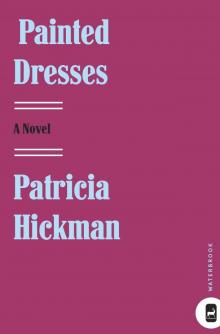 Painted Dresses
Painted Dresses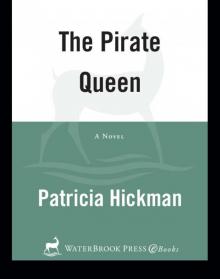 The Pirate Queen
The Pirate Queen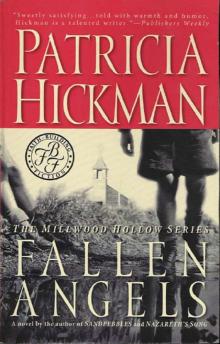 Fallen Angels
Fallen Angels Earthly Vows
Earthly Vows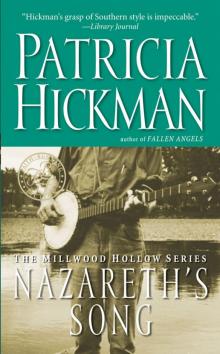 Nazareth's Song
Nazareth's Song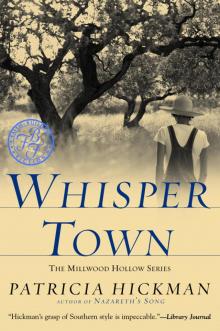 Whisper Town
Whisper Town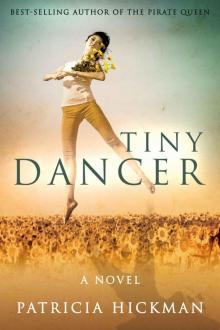 Tiny Dancer
Tiny Dancer